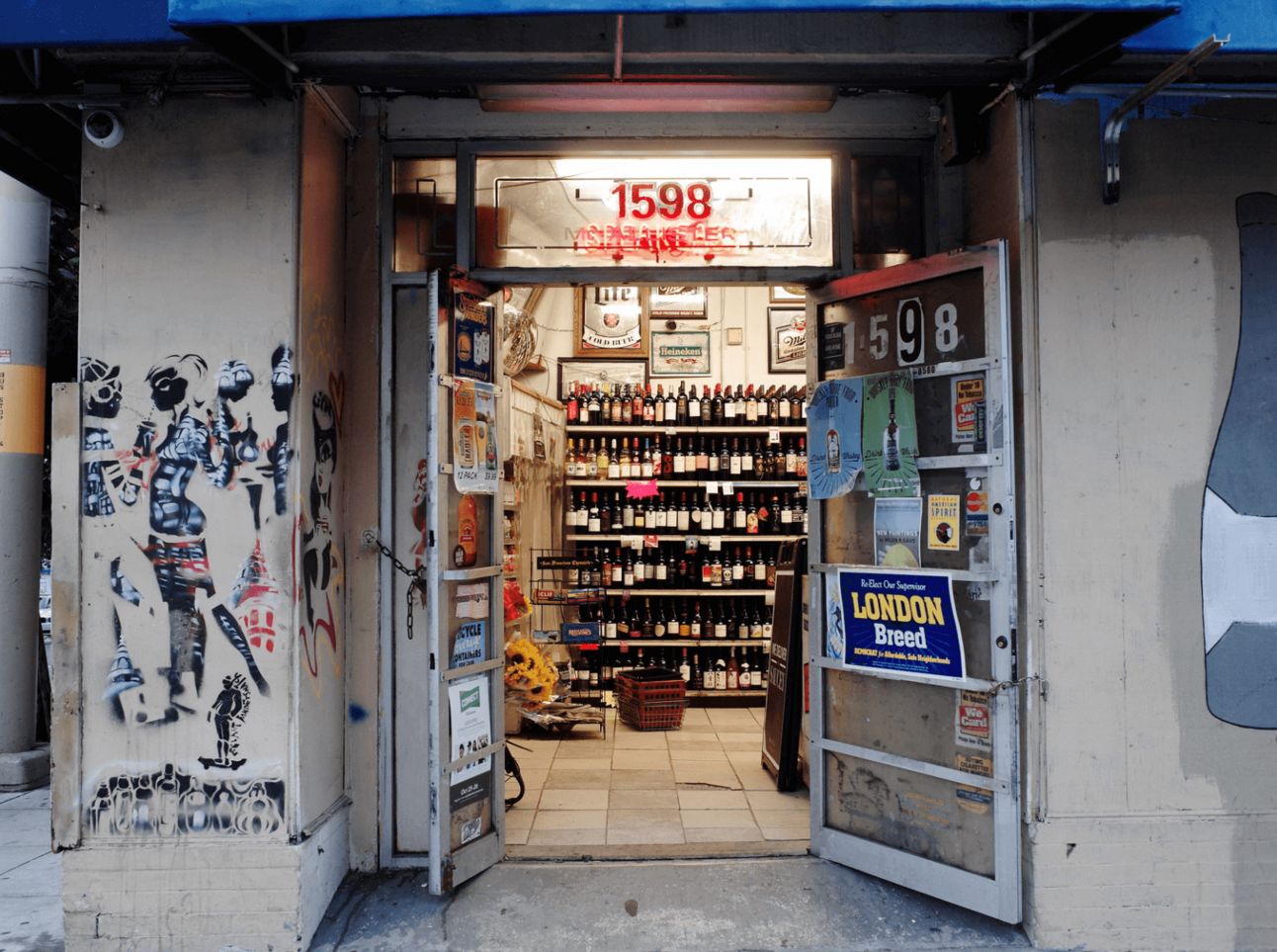
A corner store at 1598 McAllister on Divisadero Street. Courtesy of Kathy Drasky / Creative Commons.
Regionality, mostly. The name is seemingly so universal yet specific to New York, and grappling with this contradiction are people on Twitter who bemoan that bodegas and corner stores are the same thing.
Went to New York and now I can’t stop saying bodega pic.twitter.com/EzpV7O2B6e
— Colin Blanc (@icewintrs) January 9, 2022
I remember my first time going to ny and I ask where ya corner store atthey was like what!? A corner store that sell all type of shit inside…they said you mean a Bodegayea that shit
— IG:ohslimcooking (@Ohdatzslim1804) January 10, 2022
Wikipedia says,'A convenience store may also be a cold store, party store (Michigan), bodega (New York City), tienda de barrio (Latin America), carry out, mini-market, mini-mart, corner shop, superette (New Zealand/US), corner store. I think we need to ask US Twitter!
— Tony Thorne (@tonythorne007) January 11, 2022
The Spanish word for “warehouse,” bodega was used by Spanish-speaking folks coming to New York in the 1900s to describe the small stores that sold fresh, packaged, and prepared foods; drinks; cigarettes; newspapers, Gothamist columnist Jake Dobkin explained.
As this population grew, usage of the word expanded beyond Spanish speaking communities, and it is one of several words that reflect New York City’s diverse history of immigrants and their contributions in operating critical essential-needs businesses (see also: “deli,” “the Mexican Place,” “the Chinese place,” as Dobkin points out).
Bodega has also come to be generalized to refer to often immigrant-run businesses with offerings personalized to their neighborhoods and ethnic identities.
Regional differences aside, the mythos of the “bodega cat” is ever-expanding, with videos like the 2018 “that’s a great cat” video baked into the internet’s collective consciousness (A Spider-Man video game set in NYC even quotes the video verbatim).
Accounts like Bodega Cats have amplified the video, alongside documenting the beloved animals who take up residence among small shops’ shelves, counters, and aisles.
Alas, corner store cats in the rest of the world have been subsumed under the bodega label: the account posts animals in shops from outside NYC, recently resharing the SF Gate article about San Francisco’s “fancy lookin'” Tosca, a black-and-white bow-wearing cat who can be found at Nabila’s Naturals in Hayes Valley.
Peep my new hoodie @Bodegacats_ pic.twitter.com/X4DUbxu49q
— Cristóbal (@TakingACarnap) January 11, 2022
“We know the pulse of the neighborhood,” Miriam Zouzounis of Ted’s Market said to SF Weekly.
Perhaps with less internet ubiquity, neighborhood stores in SF play a similar role in their respective neighborhoods and in the city at large.
SF has the highest number of liquor stores per capita, and as the pandemic continues to lay bare both structural inequity and our interdependences upon one another, these neighborhood corner stores have played a vital role in providing food and other essentials for people amid wariness of larger grocery chains, in addition to social connectivity amid the need for social distancing.
Any New Yorker will tell you that bodegas are among the most vital small biz in our daily lives with deep roots in our communities. With more so-called instant delivery companies popping up, we can’t let them be displaced. My colleagues and I won’t let that happen on our watch pic.twitter.com/NF1qopNSoH
— Carlina Rivera 利華娜 (@CarlinaRivera) January 9, 2022
Wherever they’re located, however they’re referred to, a 2016 study from the Centers for Disease Control and Prevention on increasing access to healthy food found the owners and managers of the stores in the study described their stores as places of gathering, social centers, and communication hubs.
“Bodegas are the very heart of New York City’s culture and economy,” NYC auditor Brad Lander said at a rally in support of mom-and-pop neighborhood businesses and in response to “ghost stores” that rent storefront for mini-warehouse storage space of goods predicted by algorithms, as reported by amNewYork.
As NYC’s bodegas fend off their automated, algorithmic counterparts, Stockwell, the startup once infamously-named “Bodega”, serves as a reminder of the human connection and hyperlocal community valued by patrons of mom-and-pop businesses. It was unable to find a viable business model for its smart vending machine, and shut down July 2020, in the earlier months of the pandemic.
The startup had installed its smart vending machines in 50 locations in SF, and received furious criticism of its name and plans to expand to NYC.
“Challenging the urban corner store is not and has never been our goal,” CEO and cofounder Paul McDonald wrote in a response blog post. “[They] offer an integral human connection to their patrons that our automated storefronts never will.”
The post What’s A Bodega To A Corner Store? appeared first on Broke-Ass Stuart's Website.







